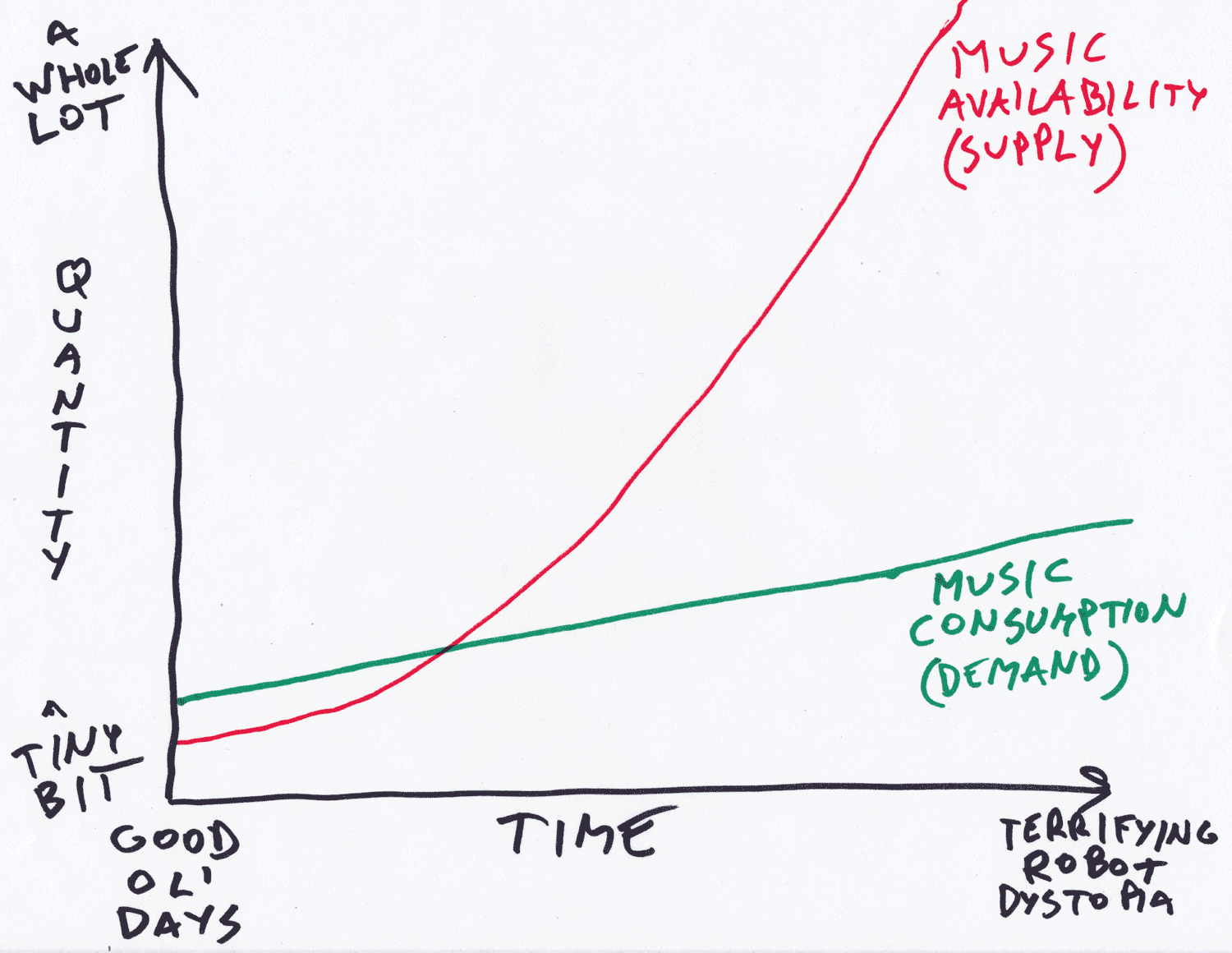The next time you’re engaging in a conversation on whether Spotify is shafting artists (they aren’t), whether merch / 360 deals will be a significant new revenue source (they won’t), whether the middle tier of the long tail is suffering (they are), whether user centric is fairer (maybe a tiny bit, sure), whether labels / publishers are evil (some are, some aren’t), or whether the [whatever band you think is innovating on business] model is the way forward (it isn’t), please make sure you acquaint yourself with the really gorgeous graph above and understand what it means.
The biggest transformation in music in the 21st century has been the explosion of supply coupled with no significant increase in demand. Anyone with a basic grasp of ECON 101 supply and demand can decipher what that means for the value of a single piece of recorded music. 📉

Explosion of Supply
The digital era brought about two major shifts. Naturally this is grossly oversimplified and the change has been gradual, but overall this is accurate.
#1 Explosion in Availability
Back in “the good ol’ days” the recorded music at one’s reach was drastically limited by the shelf space of your local vendor, the financial viability of keeping less-than-currant items in print and your willingness to actually put in the time, effort and $ to bring home a physical item that held the music.
Today, keeping things “in print” requires next to no effort, “stocking” next to unlimited amounts of recordings and consuming things on a whim are easy.
For contrast, Amoeba Records, one of the meccas of record geeks around the world, stocks about 100,000 records. Spotify today has roughly 30M tracks, which (assuming we’re not nitpicking on singles, eps etc) translates to roughly 30x Amoeba. Amoeba’s stock is limited by its 22k sq ft of floor space. Spotify’s only by constantly growing supply from labels and constantly declining tech infra costs.
#2 Reduction in Barrier to Entry
Anyone can make music. Not everyone should, but every day there’s less and less restrictions, gatekeepers of financial realities that prevent someone from putting a piece of their soul out there.
This goes beyond just getting a master track produced. Promotion, distribution, marketing and other functions of getting music from just a hobby to a product are far easier to reach than ever before.
Services like Splice, Tunecore, Landr, and SoundCloud are making it affordable and easy to get a track cut, mastered, distributed, and marketed from the comfort of one’s own home.
#1 + #2 = ∞
When you put these two together you have cumulative growth that knows no bounds.
Every single track ever recorded is theoretically available, appended to by new stuff every second.
There’s no need for “out with the old, in with the new”. A great track from 2004, 1993, 1979 or 1957 is still awesome today and fighting for the same bandwidth as a track cut last night.
Which gets us to the other side of the equation…
Stagnation of Demand
Even though being a music consumer has never been easier, there’s a finite number of people in the world (albeit growing way too fast) and each of those humans share one thing: they only have 24 hours each day to distract their daily lives with entertainment. However big of a music fan you are, you can’t allocate more than that to listening to it.
The 21st century has also brought new competitors to fight for those limited 7B x 24 hours: binge watching tv series, playing video games and other such activities have moved aggressively to the areas of life previously dominated by music.
Overall still, the ability of humankind to consume music isn’t and won’t grow significantly. Unless we somehow evolve into being able to listen to multiple songs at once and enjoy them all. I’m looking at you, Every Noise at Once, to truly live up to your name and add a “play all” button.
This dynamic is fundamental in every discussion on the future (and past) of the music industry and the challenges the transition has brought.
So please do everyone a favor and next time you engage in a healthy / heated debate on “the biz”, make sure everyone in it realizes this underlying cause.


